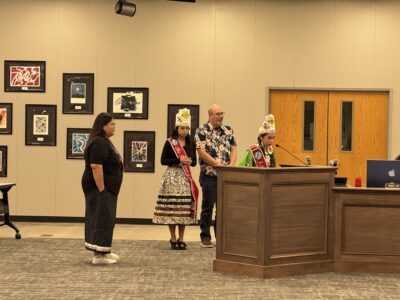Black Jack Battlefield is facing financial challenges, but still hanging on

photo by: John Young
Abolitionist John Brown, played by Kerry Altenbernd, of Lawrence, walks away after giving a guided tour commemorating the 156th anniversary of the Battle of Black Jack at the Black Jack Battlefield Saturday, June 2, 2012 east of Baldwin City.
It’s been nearly 170 years since the Battle of Black Jack, and the stewards of the site of what’s widely considered the first real battle of the Civil War near Baldwin City remain focused on sharing that history through walking tours and reenactments.
But the future of Black Jack Battlefield, for now, is a little less certain. The battlefield, a nonprofit, is in the midst of financial troubles that have left it treading water.
“Is Black Jack going to disappear tomorrow? No, we’re not at that point where the bank is presenting us with foreclosure or (to) sign a deed in lieu of foreclosure,” Johnathan Hart, president of the Black Jack Battlefield Board of Trustees, told the Journal-World. “… What we don’t want to have happen is one more brick laid on the wall, one more obligation, one more thing happens, because then the dominoes will start to tumble. So when you say how serious is it, from a trustee’s perspective, if you are one step away from financial failure, that’s as bad as it gets.”
The Journal-World spoke with Hart and Kerry Altenbernd, the board’s vice president, earlier this week to learn more about what led to the current state of affairs.

photo by: Elvyn Jones
Reenactors of slave state forces respond to an ambush of John Brown’s Free State militia at a recreation of the 1856 Battle of Black Jack. The site three miles east of Baldwin City on U.S. Highway 56 is open daily for self-guided tours of the battlefield.
It all started with a decision to pursue a $2.1 million capital campaign. Hart said the funds were intended to cover the cost of rebuilding the Robert Hall Pearson Homestead at the battlefield into a visitor education center. The group also wanted to install permanent signage and a green parking lot.
The campaign also aimed to fund restoration and preservation work at the battlefield — overgrown trees and brush made for what felt like an inauthentic viewing experience — and efforts to replant the land with native prairie tallgrass.
“It had gotten to a point where it was really starting to impact the way that you perceived the battle,” Hart said. “… One of the tenets that we wanted to try to tackle was restoring the battlefield, preserving the battlefield and replanting it back to prairie. That way, it would have looked as similar as we can make it in the modern world to something that John Brown would have recognized from the battle.”
Initially, that campaign was a success. Hart told the Journal-World that over the course of about a year, the campaign secured pledges up to that $2.1 million goal, including an $800,000 pledge over five years from a charitable foundation matched by a $200,000 individual contribution from a member of the foundation.
The seeds of the current financial strife began to sprout in late 2023. Black Jack’s board received a legal notification that the foundation was dissolving, leaving Black Jack listed as a creditor, and the personal contribution was left in “legal limbo” as the individual was admitted to hospice care and their estate was challenged.
That’s left nearly half of the entire capital campaign in a state of uncertainty.
Work had already begun or been completed for all of the capital campaign projects besides the visitor education center in the lead-up to that notification, and Hart said the board wanted to keep the momentum going. That all prompted the board to secure a bridge loan — a type of short-term financing taken out until permanent or longer-term financing has been secured — with the capital campaign pledges serving as legal obligation.
The loan was converted into a mortgage, which has tied up much of Black Jack’s funds in regular payments and left little to nothing for day-to-day operations. Grants had previously allowed the nonprofit to bring in an executive director for the first time back in 2022, but the position was quickly eliminated and currently isn’t possible to subsidize, leaving everything to the volunteer board of trustees.
“We really stripped it down and battened down the hatches,” Hart said. “And we’ve been able to float for a little while, but we were reaching a point where it was, quite honesty, becoming difficult for us to make the mortgage payments.”
That led to the board launching a $10,000 GoFundMe campaign on June 1. After 15 days, the campaign had surpassed that goal and remains open with a new target of $15,000.

photo by: Elvyn Jones
The Black Jack Battlefield Board of Trustees is looking to undertake a series of improvements at the site east of Baldwin City. Included among them is a visitor center that would be built near the Robert Hall Pearson farmstead, pictured on April 24, 2021, which is also part of the park.
The funds from the GoFundMe campaign are intended to keep things running while the board works toward another possible solution: striking up strategic partnerships that could give Black Jack Battlefield a more solid foothold in Douglas County. But Hart and Altenbernd said that’s still a work in progress, especially as Black Jack will need to rebuild confidence in its stability after going public with the current financial situation.
“The board can’t keep doing the same things that we’ve been doing, if for no other reason than we have to be able to rebuild the confidence that folks had in us to be able to do what we need to do to take care of Black Jack,” Hart said.

photo by: John Young
Kerry Altenbernd portrays John Brown during a guided tour of the Blackjack Battlefield Sunday, Aug. 17, 2014, at the Blackjack Battlefield and Nature Park, located a couple of miles east of Baldwin City.
• • •
Issues like this are nothing new for nonprofits, Altenbernd told the Journal-World — there are always funding issues to contend with.
“It’s kind of a boom or bust cycle year after year,” Altenbernd said. “You’re either in clover or you’re in the mud, and it’s just one of those cyclical things.”
Both he and Hart said Black Jack’s story is “too important” to continue on that boom-bust cycle.
“We’ve done nothing wrong, that’s the thing, and things still didn’t go right,” Altenbernd said. “So we’re at that point of trying to figure out how to make sure that doesn’t happen again.”
For now, Hart said Black Jack is willing to work with “anybody and everybody” who’d like to volunteer or help in another way. He encouraged people interested in volunteering to reach out to info@blackjackbattlefield.org to learn what they can do.
In terms of funding support, Hart said the proceeds from the GoFundMe campaign leave Black Jack with at least three or four months of breathing room, but additional contributions to the campaign or directly to the nonprofit’s endowment with the Douglas County Community Foundation would be welcome.
Hart also said the nonprofit has no plans to stop its usual battlefield tours and other activities.
Above all, Altenbernd said that the “paramount issue” for Black Jack is simple — it must survive as it is now.
“What it has been in the past must continue — that is the absolute bottom line,” Altenbernd said. “It must be able to remain a national historic landmark. It must be able to remain on the national and state registers of historic places; those are pretty much non-negotiable.”

photo by: John Young
Civil War re-enactor Thom Weik, Lawrence, takes cover in some tall grass as he reloads his rifle during a guided tour commemorating the 156th anniversary of the Battle of Black Jack at the Black Jack Battlefield Saturday, June 2, 2012, east of Baldwin City.

Boy Scouts playing the role of Henry Pate’s militia fire on the forces of John Brown in a re-enactment Saturday of the Battle of Black Jack. Eleven local Boy Scout troops and one Cub Scout pack took part in a camporee last weekend at the historic site, which included to re-enactments of the 1856 battle complete with smoke and recorded gunfire.







